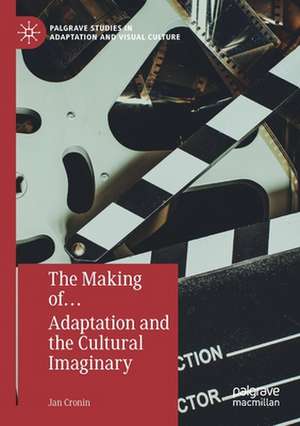The Making of… Adaptation and the Cultural Imaginary: Palgrave Studies in Adaptation and Visual Culture
Autor Jan Croninen Limba Engleză Paperback – 31 dec 2020
| Toate formatele și edițiile | Preț | Express |
|---|---|---|
| Paperback (1) | 452.62 lei 6-8 săpt. | |
| Springer International Publishing – 31 dec 2020 | 452.62 lei 6-8 săpt. | |
| Hardback (1) | 530.10 lei 6-8 săpt. | |
| Springer International Publishing – 9 dec 2019 | 530.10 lei 6-8 săpt. |
Din seria Palgrave Studies in Adaptation and Visual Culture
-
 Preț: 179.31 lei
Preț: 179.31 lei - 20%
 Preț: 816.29 lei
Preț: 816.29 lei - 20%
 Preț: 753.24 lei
Preț: 753.24 lei - 18%
 Preț: 774.83 lei
Preț: 774.83 lei - 15%
 Preț: 638.11 lei
Preț: 638.11 lei - 15%
 Preț: 706.16 lei
Preț: 706.16 lei - 15%
 Preț: 498.94 lei
Preț: 498.94 lei - 15%
 Preț: 577.40 lei
Preț: 577.40 lei - 18%
 Preț: 943.57 lei
Preț: 943.57 lei - 18%
 Preț: 728.43 lei
Preț: 728.43 lei -
 Preț: 385.08 lei
Preț: 385.08 lei - 15%
 Preț: 694.37 lei
Preț: 694.37 lei - 18%
 Preț: 783.98 lei
Preț: 783.98 lei - 18%
 Preț: 893.40 lei
Preț: 893.40 lei -
 Preț: 382.36 lei
Preț: 382.36 lei - 18%
 Preț: 944.51 lei
Preț: 944.51 lei - 18%
 Preț: 727.48 lei
Preț: 727.48 lei - 15%
 Preț: 578.55 lei
Preț: 578.55 lei - 15%
 Preț: 586.23 lei
Preț: 586.23 lei - 15%
 Preț: 701.90 lei
Preț: 701.90 lei - 15%
 Preț: 580.49 lei
Preț: 580.49 lei - 18%
 Preț: 733.65 lei
Preț: 733.65 lei -
 Preț: 424.12 lei
Preț: 424.12 lei - 18%
 Preț: 1115.63 lei
Preț: 1115.63 lei - 15%
 Preț: 637.46 lei
Preț: 637.46 lei - 15%
 Preț: 699.77 lei
Preț: 699.77 lei - 18%
 Preț: 784.30 lei
Preț: 784.30 lei - 15%
 Preț: 704.69 lei
Preț: 704.69 lei - 18%
 Preț: 893.71 lei
Preț: 893.71 lei - 18%
 Preț: 952.09 lei
Preț: 952.09 lei - 15%
 Preț: 644.63 lei
Preț: 644.63 lei - 15%
 Preț: 701.90 lei
Preț: 701.90 lei
Preț: 452.62 lei
Nou
Puncte Express: 679
Preț estimativ în valută:
86.62€ • 89.67$ • 73.21£
86.62€ • 89.67$ • 73.21£
Carte tipărită la comandă
Livrare economică 05-19 martie
Preluare comenzi: 021 569.72.76
Specificații
ISBN-13: 9783030283513
ISBN-10: 3030283518
Pagini: 271
Ilustrații: X, 271 p. 1 illus.
Dimensiuni: 148 x 210 mm
Greutate: 0.37 kg
Ediția:1st ed. 2019
Editura: Springer International Publishing
Colecția Palgrave Macmillan
Seria Palgrave Studies in Adaptation and Visual Culture
Locul publicării:Cham, Switzerland
ISBN-10: 3030283518
Pagini: 271
Ilustrații: X, 271 p. 1 illus.
Dimensiuni: 148 x 210 mm
Greutate: 0.37 kg
Ediția:1st ed. 2019
Editura: Springer International Publishing
Colecția Palgrave Macmillan
Seria Palgrave Studies in Adaptation and Visual Culture
Locul publicării:Cham, Switzerland
Cuprins
1.Introduction: “The Making of…,” Adaptation and the (Trans-)Cultural Imaginary.- 2.Adapting The Quiet Man.- 3.Making and Memorializing The Quiet Man in Ireland.- 4.The “Making of” The Quiet Man: Popular Studies and Documentaries.- 5. “Taking Liberties with Reality”: “Fiction” and the “Making of” The Quiet Man.- 6. The “Making of” Palimpsestuous Adaptation in José Luis Guerín’s Innisfree.- 7. The “Making of” Artistic and Cultural Adaptation in Roddy Doyle’s The Dead Republic.- 8. Adapting Gone with the Wind.- 9. The “Making of” Gone with the Wind: Popular Studies and Documentaries.- 10. “Time-machine[s]”: Dramatizing the “Making of” Gone with the Wind.- 11. Exhibiting the “Making of” Gone with the Wind.- 12. Conclusion: The “Making of” “Middle-earth Aotearoa”
Notă biografică
Jan Cronin is a Senior Lecturer in English in the School of Humanities at the University of Auckland, New Zealand. She specializes in Irish Studies, New Zealand literature and Adaptation Studies.
Textul de pe ultima copertă
This book explores “Making of” sites as a genre of cultural artefact. Moving beyond “making-of” documentaries, the book analyses novels, drama, film, museum exhibitions and popular studies that re-present the making of culturally loaded film adaptations. It argues that the “Making of” genre operates on an adaptive spectrum, orienting towards and enacting the adaptation of films and their making. The book examines the behaviours that characterise “Making of” sites across visual media; it explores the cultural work done by these sites, why recognition of “Making of” sites as adaptations matters, and why our conception of adaptation matters. Part one focuses on the adaptive domain presented by the “Making of” John Ford’s The Quiet Man. Part two attends to “Making of” Gone with the Wind sites, and concludes with “Making of” The Lord of the Rings texts as the acme of the cultural risks and investments charted in earlier chapters.
Caracteristici
First study of “Making of” sites, across a range of visual media, as a genre of cultural artefact First study of “Making of” sites, across a range of visual media, as adaptations Examines the cultural stakes attendant on how we think about adaptation
